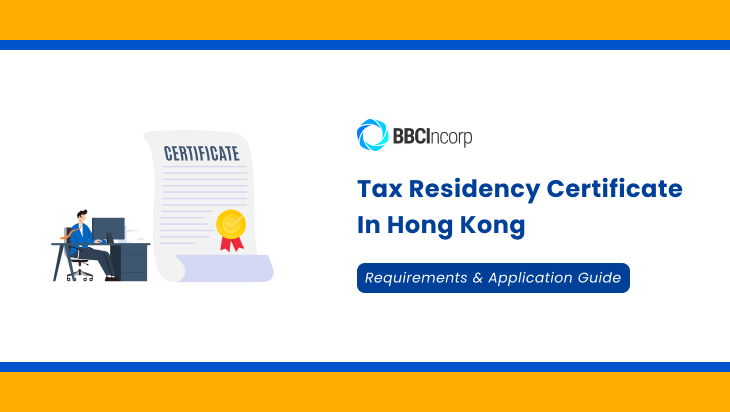
- What is a certificate of resident status in Hong Kong?
- Advantages of the certificate of resident status
- The eligibility criteria to apply for the CoR
- How to get tax residency certificate in Hong Kong
- Renewal and updates to your resident status
- Common challenges and reasons for rejection
- How BBCIncorp can support your tax residency certificate application
- Conclusion
What is a certificate of resident status in Hong Kong?
In Hong Kong, the Certificate of Resident Status (CoR), also known as a tax residency certificate, is a document issued by the Inland Revenue Department.
It serves as an official confirmation of an individual or company’s tax residency status in Hong Kong, enabling them to access benefits outlined in Double Taxation Agreements.
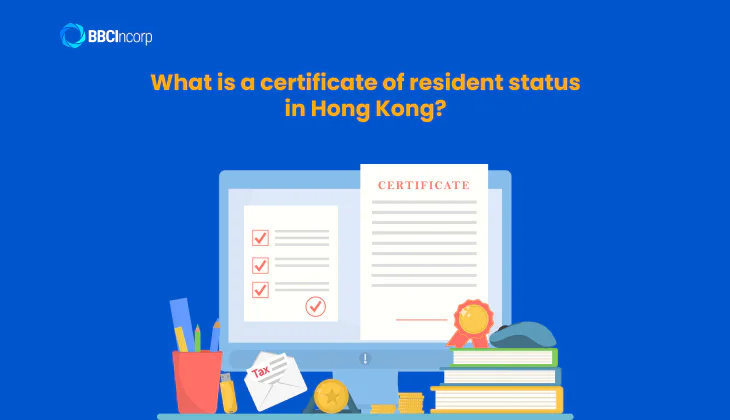
Is the Certificate of Resident Status the same as Permanent Residency?
While their names may seem similar, these two documents serve distinct purposes and should not be confused.
The CoR is related to tax affairs and is issued by the Inland Revenue Department. It does not grant the privilege of permanent residence or the right to work indefinitely in Hong Kong.
On the other hand, Permanent Residency, or the Permanent Identity Card, gives individuals the freedom to live and work in Hong Kong without any limitations. This status is granted by the Immigration Department through a separate application process unrelated to tax matters.
Advantages of the certificate of resident status
There are three advantages to obtaining a CoR to conduct business, because of its significant impact on your company’s tax status:
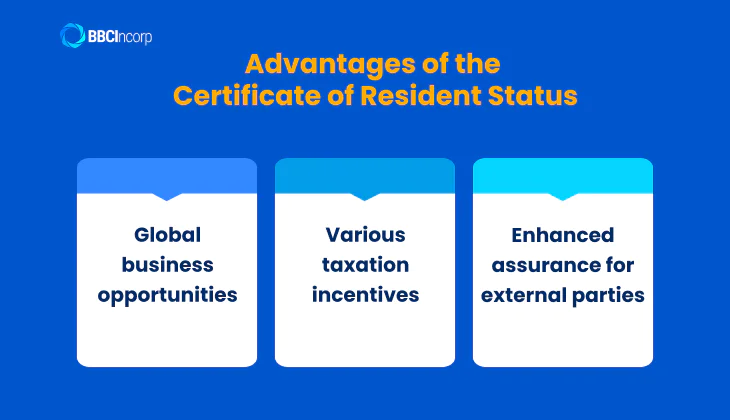
Global business opportunities
The CoR is a recognized proof of residence in Hong Kong, allowing individuals and entities to participate in global business activities and transactions with greater ease. It establishes credibility and trustworthiness when engaging in international trade and partnerships.
This certificate also proves instrumental in streamlining various transactions and interactions, both locally and internationally.
Various taxation incentives
Individuals or companies holding a Certificate of Residency (CoR) may enjoy tax incentives through the government’s Double Taxation Agreements (DTAs) with various countries. These incentives may include: withholding tax relief, elimination of double taxation, tax credits, reduced tax rates on certain types of income, and so on.
Keep in mind that each DTA provision applies specific requirements and criteria regarding the grant of relief from foreign taxes. Having a CoR doesn’t guarantee your automatic success in claiming benefits under the relevant DTA.
Enhanced assurance for external parties
Beyond tax benefits, a CoR helps strengthen a company’s credibility, especially in dealings with external stakeholders like financial institutions, clients, partners, and so forth.
For instance, when you’re opening a bank account, many institutions ask for this document as part of their checks. With the CoR, the applicant’s financial stability and tangible proof of their tax residency are demonstrated, boosting the financial entity’s confidence during due diligence.
The eligibility criteria to apply for the CoR
To qualify for the Hong Kong CoR, the applicant must have ordinary residence within the territory. This involves meeting certain criteria such as a substantial duration of stay, having personal and economic ties to Hong Kong, and expressing a clear intention to reside legally in the region.
In broad terms, individuals and entities listed below are eligible to apply for a Certificate of Resident Status:
For Individuals:
Those who ordinarily reside in Hong Kong; or
- Individuals staying in Hong Kong for more than 180 days during a specific year of assessment; or
- Individuals staying in Hong Kong for over 300 days in two consecutive years of assessment, with one of them being the relevant year of assessment.
For Companies/ Partnerships/ Trusts/ Bodies of Persons:
- Entities that are legally formed or established in Hong Kong; or
- Entities formed or established outside Hong Kong but managed or controlled from within Hong Kong.
Be sure to carefully review the criteria outlined on the Inland Revenue Department’s website to ascertain if you meet the requirements.
How to get tax residency certificate in Hong Kong
Let’s break down the key steps and considerations when applying for your tax residency certificate:
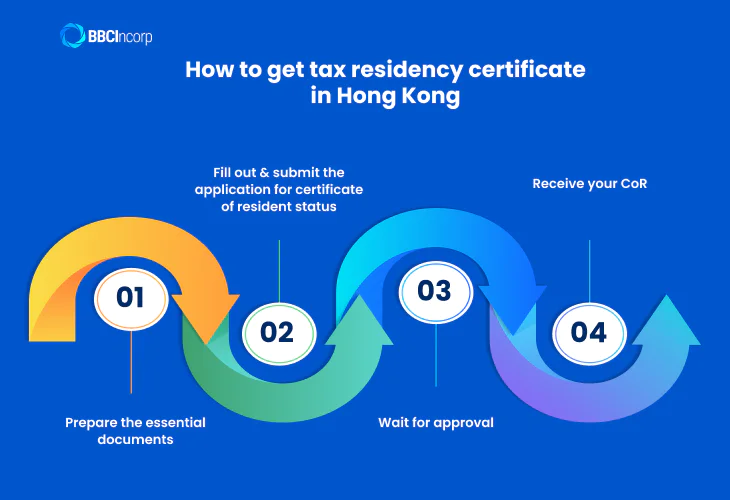
Step 1: Prepare the essential documents
Which elements are typically required when applying for the CoR? These may encompass proof of ordinary residence, employment details, and any other paperwork specified by the relevant tax authorities. For instance:
For Individuals:
- Personal identification such as your Hong Kong ID or your passport copy;
- Address verification such as utility bills or rental agreements;
- Proof of employment or business operations in Hong Kong during the claim period;
- How much income is generated from the treaty party and the nature of the income; and
- Other required information in the application form.
For Companies/ Partnerships/ Trusts/ Bodies of Persons:
- Details about your entity, including its name, registered address, and business registration number;
- Description of your business nature
- Information about the location of incorporation
- Details about the nationality, residential address, and key responsibilities of the company officers;
- Information about the income generated from the treaty party and the nature of that income; and
- Other required information in the application form.
It’s important to be aware that tax authorities may specify additional materials necessary for the certificate of residency application. These could vary based on your specific individual circumstances.
Step 2: Fill out and submit the application for certificate of resident status
Having completed the supporting documents and confirming your eligibility, it’s time to put together your application. You can find the form required by the Inland Revenue Department right below:
For Individuals
- If the DTA partner is the Mainland of China: Form IR1314A (06/2023)
- For all other jurisdictions: Form IR1314B (06/2023)
For Companies/ Partnerships/ Trusts/ Bodies of Persons
- If the DTA partner is the Mainland of China: Form IR1313A (06/2023)
- For all other jurisdictions: Form IR1313B (06/2023)
It’s essential to make sure that you fill out the form with accurate and up-to-date information before submission. Following this, the next step involves sending your application to the Inland Revenue Department (IRD) and awaiting their response.
Step 3: Wait for approval
In most cases, within 21 working days after receiving a qualified application, the IRD will issue to you either:
- The Certificate of Resident Status, or
- Notification of further details required; or
- A notice informing that the application cannot be accepted.
Step 4: Receive your CoR
After successful verification, the IRD will proceed to issue your CoR.
The certificate will most likely be sent to you by post. However, if you prefer to collect it in person, you must include a written request when submitting the relevant form along with the necessary documents.
With the acquisition of the CoR, you are now well-positioned to benefit from tax treaties offered by the jurisdiction. Note that any changes to your business during the assessment year must be reported to the Inland Revenue Department.
How do you renew or update information on your tax residency?
Generally, the CoR remains valid for only one year. Hence, to uphold your status, you must undergo the renewal process before the expiration date. As with the initial application, the renewal process involves submitting a form and crucial documents.
Your tax residency status can be reverted if you fail to renew the certificate, which could result in increased tax liabilities, so make sure to stay ahead of the deadlines.
Renewal and updates to your resident status
Maintaining a valid Certificate of Resident Status requires ongoing attention. This is because the Inland Revenue Department treats residency as an active and continuously verified position rather than a one time approval.
Procedures for renewing the certificate of resident status
A Certificate of Resident Status is generally valid for one year, and the renewal procedure follows the same structure as the initial application.
In particular, applicants submit updated information through the Inland Revenue Department’s electronic services or by delivering the completed form directly to the department. Renewal requires confirming that the applicant still meets the criteria for Hong Kong tax residency and providing supporting evidence when requested. Then, the Inland Revenue Department reviews the updated information and issues a new certificate once it is satisfied that the residency position remains unchanged.
Reporting changes in residency information to authorities
Any material change in personal or corporate circumstances should be reported to the Inland Revenue Department without delay. This includes a new address, a change of employer, an alteration in business ownership, or a shift in the place where key management decisions occur.
Keep in mind that timely reporting helps ensure that the department can confirm ongoing eligibility under each double taxation agreement. This is particularly important because the Inland Revenue Department now places strong emphasis on clarity and accuracy of residency information when assessing treaty based claims.
Implications of the loss of resident status
If an individual or company does not renew its Certificate of Resident Status or fails to update relevant information, the Inland Revenue Department may determine that the entity no longer qualifies as a Hong Kong tax resident.
However, the loss of resident status carries meaningful consequences. Without a valid certificate, taxpayers may lose access to reduced withholding rates or exemptions under a double taxation agreement and may face higher tax exposure in treaty partner jurisdictions. As a result, companies with cross border income flows may face increased administrative burdens when claiming relief, while individuals may no longer benefit from treaty based protections.
To avoid these implications, you can safeguard your Hong Kong tax resident position with proactive renewal, accurate information, and regular communication with the Inland Revenue Department, preserving access to all treaty benefits available under Hong Kong’s tax agreements.
Common challenges and reasons for rejection
Understanding why the Hong Kong IRD rejects applications for a tax residency certificate allows applicants to prepare more confidently and avoid unnecessary delays. Although the IRD updated its approach in recent years to rely more closely on the plain definition of residency under each double taxation agreement, challenges still arise when the evidence does not match.
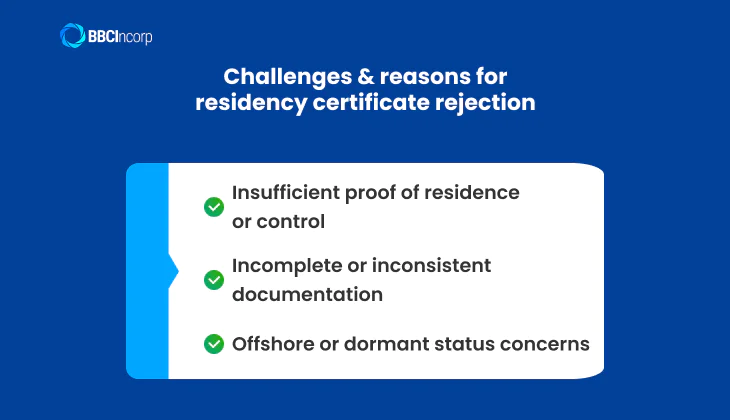
Insufficient proof of residence or control
Even though the IRD now issues certificates of resident status based on the definition found in each treaty, certain cases still require proof of management or control in Hong Kong. This applies mainly to foreign incorporated companies that must show they are normally managed or controlled in Hong Kong. Companies without meeting records, decision making activities, or senior personnel based in the city may face rejection.
Professional tax sources note that applications are rejected when an entity appears to operate entirely outside Hong Kong while expecting recognition as a Hong Kong tax resident. In addition, applicants who fall under a treaty definition that goes beyond simple incorporation should make sure that their evidence demonstrates an authentic Hong Kong connection.
Incomplete or inconsistent documentation
The most frequent issue continues to be documentation that does not match the information previously submitted to the IRD. A tax residency certificate application is reviewed alongside tax returns, financial statements, business registration records, and corporate filings. If the dates, addresses, or business details differ between these documents, the IRD may conclude that the residency claim is not sufficiently supported.
Missing materials such as audited financial statements, signed tenancy agreements, employment proofs, or business activity records also create risk.
Offshore or dormant status concerns
The IRD may raise questions when a company declares offshore profits or shows signs of dormancy. This does not automatically disqualify an applicant, especially if the entity is incorporated in Hong Kong, but it does require a clearer explanation.
Offshore companies in Hong Kong sometimes struggle to demonstrate why they should receive a tax residency certificate if most commercial activities occur outside the city. When the IRD identifies minimal or no Hong Kong-based activity, it may request further information to confirm that the residency position is genuine under the relevant treaty definition.
Preparing a consistent and well-documented application is the most effective way to avoid rejection of a tax resident certificate. Thus, clear evidence, accurate records, and transparency about business activities allow applicants to meet Hong Kong IRD expectations with confidence.
How BBCIncorp can support your tax residency certificate application
BBCIncorp supports clients through every stage of securing a tax residency certificate in Hong Kong. Our team offers clear and practical guidance, leveraging extensive experience in Hong Kong tax compliance and corporate administration.
First, we begin with a structured eligibility review, examining incorporation details, management arrangements, business activity, and the residency definition under the relevant tax treaty to confirm whether a certificate of resident status is achievable. Then, the BBCIncorp team assists with preparing and reviewing the documents required for a successful application.
For international clients with cross border structures, we also provide guidance on substance, control, and offshore considerations that influence Hong Kong tax residency, which encompass:
- Accounting services in Hong Kong, tax return filing & annual bookkeeping
- Hong Kong company formation
- Business bank account opening
- And other essential corporate services for doing business in Hong Kong
Take the next step with BBCIncorp and secure your Hong Kong tax resident status with BBCINcorp. Visit our site or talk with our team today for more information.
Conclusion
The tax residency certificate in Hong Kong offers significant advantages for individuals and entities engaged in business activities within the jurisdiction. Serving as an official confirmation of Hong Kong tax residency, this document grants businesses access to a variety of benefits and exemptions outlined in double taxation agreements.
Hence, if you plan to establish a business in Hong Kong or engage in activities related to this jurisdiction, it is advisable to apply for your own CoR as soon as possible to leverage the tax incentives.
For further information on conducting business in Hong Kong, feel free to reach out to us via service@bbcincorp.com and receive dedicated support.
Frequently Asked Questions
Can a TRC help reduce withholding tax in other countries
A Hong Kong Tax Residency Certificate, formally known as a Certificate of Resident Status, allows individuals and companies to claim benefits under Hong Kong’s double taxation agreements with other jurisdictions. It is used to reduce withholding tax on dividends, interest, and royalties earned abroad. Without a TRC, foreign authorities may apply the standard withholding tax rate, increasing the tax burden.
By presenting a valid certificate, taxpayers can demonstrate that they are legally recognized as residents of Hong Kong and qualify for treaty benefits. This ensures cross‑border income is taxed according to the applicable agreements and prevents double taxation.
How do you determine your tax residency?
Tax residency in Hong Kong depends on whether an individual is ordinarily residing in the city or whether a company is managed and controlled in Hong Kong.
- For individuals, this includes habitual residence and the location of family and employment.
- For companies, it is determined by where key management and strategic decisions are made, including board meetings and executive oversight.
Establishing tax residency is crucial because it determines eligibility for a Hong Kong Tax Residency Certificate and access to benefits under double taxation agreements.
Can a TRC in Hong Kong be used for foreign bank account verification or investments?
Yes. A Hong Kong Tax Resident Certificate, also called a Certificate of Resident Status, is widely accepted by foreign banks and investment institutions to verify tax residency. It is necessary when opening foreign bank accounts, making cross‑border investments, and claiming treaty benefits such as reduced withholding tax on foreign income. The certificate also supports compliance with international tax reporting obligations, including the Common Reporting Standard.
Disclaimer: While BBCIncorp strives to make the information on this website as timely and accurate as possible, the information itself is for reference purposes only. You should not substitute the information provided in this article for competent legal advice. Feel free to contact BBCIncorp’s customer services for advice on your specific cases.
- What is a certificate of resident status in Hong Kong?
- Advantages of the certificate of resident status
- The eligibility criteria to apply for the CoR
- How to get tax residency certificate in Hong Kong
- Renewal and updates to your resident status
- Common challenges and reasons for rejection
- How BBCIncorp can support your tax residency certificate application
- Conclusion
Industry News & Insights
Get helpful tips and info from our newsletter!
Stay in the know and be empowered with our strategic how-tos, resources, and guidelines.






